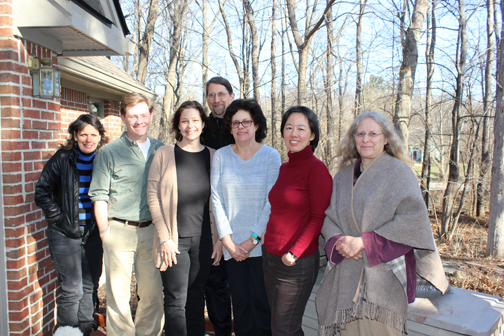
by Donna Iadipaolo
“Our paper puts forth the idea that changing the law to give townships/counties local zoning control over surface location of oil and gas wells allows them the right to choose what’s best for their own unique circumstances,” said Robinson. “Some townships would like to protect residential areas, others might want a small area near a waterway kept free of wells, others may choose to not have zoning restrictions at all….”
CITIZENS FOR OIL-Free Backyards (COFBY) recently released a position paper to guide both Republican and Democratic legislators—in a bipartisan fashion—on future legislation regarding oil and gas drilling in Michigan townships.
Earlier in March, two Michigan House bills were introduced to address the issue of oil and gas drilling in townships and counties (HB 4237 and HB 4260). These bills stemmed from two 2014 Senate bills dealing with the same concerns about local oil and gas drilling drilling determinations. COFBY researched and wrote the position paper, “Too Close to Home: The Location of Oil and Gas Wells in Michigan,” in response to these legislative actions.
“We are currently meeting with legislators of both parties to discuss our paper,” said Laura Robinson, President of COFBY.
“This issue is tremendously important to state residents of both major political parties, and to legislators as well. All the Senate and House bills put forth on this issue last year and so far this year have been sponsored by Republicans. The desire for local government to be able to choose what’s best for its own residents and own unique characteristics and to be treated fairly, the desire for protected drinking water for all of our children, and the desire for our families to be able to invest in and enjoy their own communities are universal desires not limited to any one particular party. And the time has come for us all to address it from within that framework,” said Robinson.
The Michigan League of Conservation Voters (LCV) and Michigan Environmental Council have endorsed COFBY’s paper and are also lending support to its position.
“It is critical that Michigan citizens have a say in oil and gas drilling near their homes and near their water, no matter how densely populated their cities, townships, or neighborhoods,” said Lisa Wozniak, Executive Director for Michigan LCV. “Restoring local control over the location of oil and gas wells would better provide township and county governments with rightful authority to plan their own communities and protect their natural resources.”
James Clift, Policy Director for the Michigan Environmental Council said, “New technologies give oil and gas drillers much more flexibility regarding the placement of drilling pads and surface infrastructure. This change should foster legislative changes under which oil and gas developers work with local units of government to devise development plans that minimize conflicts and maximize benefits for communities across the state.”

People in Scio Township, Ann Arbor and other communities have been concerned about drilling near their homes, but for many it is also a matter of giving local residents control over the surface location of oil and gas wells in their townships and counties.
According to the members of COFBY, local control overseen by local units of government could alleviate nuisance and potential environmental contamination in areas, including near homes. In February, first-term Rep. Peter J. Lucido (R-Shelby Township) proposed legislation HB4237, which would remove the oil and gas regulation prohibition for all townships and counties in Michigan under Section 125.3205 of the Michigan Zoning Enabling Act (MZEA.) This section of MZEA addresses regulation and oil control and gas wells.
The 2006 Zoning Enabling Act prohibits townships and counties from having control over oil and gas exploration and development occurring within their boundaries. It was specifically this Act that was a major concern this past summer and fall when wells were drilled near homes and water supplies in Scio and Shelby Townships. Rep. Lucido’s bill is the first in 2015 to take up the issue of local control of oil and gas drilling in communities.
“Rep. Lucio has put forth a strong declaration that speaks for the people of the state of Michigan,” said Robinson.
“The citizens of our state deserve to be confident in knowing that when they move into a given neighborhood or buy a home in an area typified by residences they will not be looking out the window or down the street at an oil well in the future, negatively affecting their quality of life, their property, and their health, safety, and welfare. Townships and counties also deserve the right to plan for the quality and life and protection of their residents, using zoning ordinances and master plans that are legally empowered to guide development in their communities….”
According to COFBY, Rep. Lucido’s bill removes the oil and gas restrictions in the Michigan Zoning Enabling Act for all townships.This would provide local control for townships and would keep the Supervisor of Wells in control of everything that he is charged with doing under Part 615 of the Natural Resources and Environmental Protection Act. His bill was sent to the House Energy Committee, and it’s unclear if right now is the time when this bill will be acted upon in committee.
“Scio and Shelby townships put this issue on the map at the state level this past summer,” said Robinson. “Scio Township is doing everything it can legally do–a 6-month moratorium that was just extended three months and working on ordinances to address aspects of oil and gas development that are not related directly to the well. However, like all townships in the state, Scio is unable to zone for well location–in other words, oil and gas wells can go anywhere on leased or compulsory-pooled land, regardless of the zoned land use or planned land use.” Compulsory-pooled refers to landowners who are forced to give up their mineral rights despite not wishing to do so, and yes, it happens.”
According to Robinson, that means residential areas, preserved areas–any area—could potentially at present be fair game for the oil and gas industry. That has negative effects on a township like Scio, whose master plan is based on creating a community based on open-space preservation, outdoor recreation, and a rural-residential character.
“Our paper puts forth the idea that changing the law to give townships/counties local zoning control over surface location of oil and gas wells allows them the right to choose what’s best for their own unique circumstances,” said Robinson. “Some townships would like to protect residential areas, others might want a small area near a waterway kept free of wells, others may choose to not have zoning restrictions at all. We also believe that there should be required setbacks from surface water, as none exist at this time.”
Last month, the Scio Township Board of Trustees voted 7-0 to extend the Township’s moratorium on oil and gas operations for three additional months. The moratorium originally stipulated to extend to six months to expire on March 4, will now be in effect until June 4.
The original moratorium was passed after West Bay Exploration began drilling an exploratory oil well, the first in Scio Township. Citizen outcry and public pressure led the Township to approve that initial moratorium. Under the recent moratorium extension, the Township amended its master plan to include wording relevant to oil and gas operations. The Township was been working with the Traverse City-based environmental law firm Olson, Bzdok, and Howard.





The headline of this article is very misleading and somewhat bizarre. Nowhere in the article is COFBY’s “support of drilling” mentioned (because they don’t support drilling), nor is the word “fracking” mentioned (because they are not a “fracking-opposition group”). As the article explains, COFBY supports the ability of all townships to determine the surface location of oil and gas wells in accordance with local zoning and long-term planning. This is a practical approach that offers the best protection for surface water, drinking water, natural areas, schools, etc. The author of the article explains COFBY’s position very well. The author of the headline should go into fiction writing.